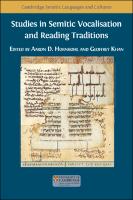Studies in Semitic Vocalisation and Reading Traditions
Contributor(s)
Hornkohl, Aaron D. (editor)
Khan, Geoffrey (editor)
Collection
ScholarLedLanguage
EnglishAbstract
"This volume brings together papers relating to the pronunciation of Semitic languages and the representation of their pronunciation in written form. The papers focus on sources representative of a period that stretches from late antiquity until the Middle Ages. A large proportion of them concern reading traditions of Biblical Hebrew, especially the vocalisation notation systems used to represent them. Also discussed are orthography and the written representation of prosody.
Beyond Biblical Hebrew, there are studies concerning Punic, Biblical Aramaic, Syriac, and Arabic, as well as post-biblical traditions of Hebrew such as piyyuṭ and medieval Hebrew poetry. There were many parallels and interactions between these various language traditions and the volume demonstrates that important insights can be gained from such a wide range of perspectives across different historical periods."
Keywords
pronunciation of Semitic languages; representation of Semitic languages pronunciation; from late antiquity until the Middle Ages; reading traditions of Biblical Hebrew; vocalisation notation systems; Punic traditions of Hebrew; Biblical Aramaic traditions of Hebrew; Syriac traditions of Hebrew; Arabic traditions of Hebrew; post-biblical traditions of Hebrew; piyyuṭ; medieval Hebrew poetry;DOI
10.11647/OBP.0207ISBN
9781783749355, 9781783749362Publisher
Open Book PublishersPublisher website
https://www.openbookpublishers.com/Publication date and place
2020Series
Cambridge Semitic Languages and Cultures,Classification
Historical and comparative linguistics
Translation and interpretation


 Download
Download Web Shop
Web Shop